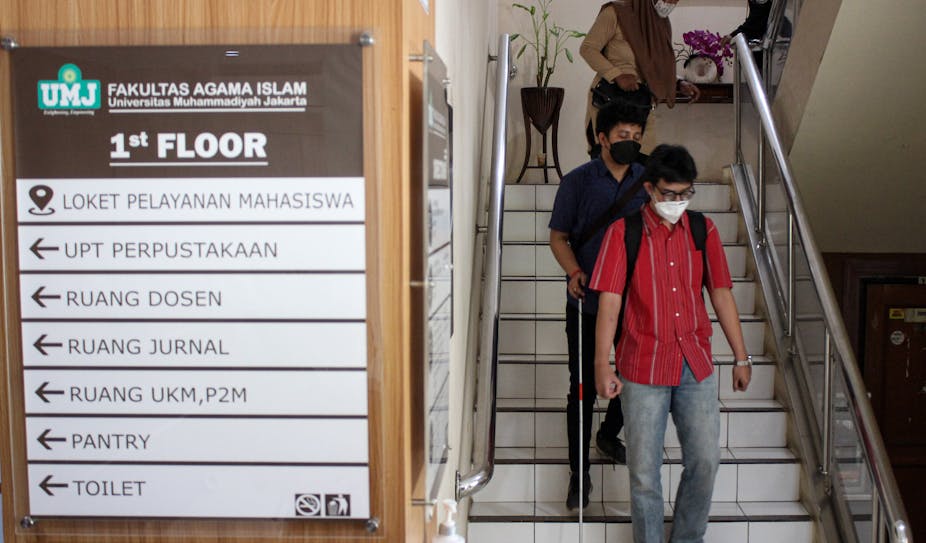The Indonesian government introduced Merdeka Belajar (independent learning) last year. It’s a new paradigm in which educational institutions deliver their services in ways that promote autonomous learning.
It is geared towards equipping students with life skills that will enable them and the country to compete globally.
Under this program, students can now pursue different pathways to acquiring knowledge and skills. These pathways include off-campus experience with educational and non-educational institutions and industry.
There is an emerging focus in the government on enabling students with a disability in their educational journey. It is timely to reflect on how educational institutions and their industry partners can ensure this program benefits students with disabilities.
Questions on benefits for students with disabilities
In higher education, the new paradigm was introduced as Merdeka Belajar, Kampus Merdeka (independent learning, independent campus).
Kampus Merdeka includes the opportunity for students to take part in non-conventional classroom learning activities.
Through three-to-six-month engagements, students can gain new skills by engaging with stakeholders outside classrooms. These programs include student exchanges, mobility awards, rural community engagement, teaching and research assistance programs, humanitarian projects, entrepreneurial projects and industry internships.
There is no indication so far that the new approach has taken into account the needs of a diverse student body.
Some tertiary institutions have not even taken the first step of establishing disability units. Clearly, there is a high risk of overlooking the needs of students with a disability.
People with a disability still face significant barriers to entry into the skilled workforce.
The question then is how will higher education institutions engage on their students’ behalf in an appropriate way when seeking to take advantage of Kampus Merdeka?
Our research into online learning during the COVID pandemic showed there is much still to learn about the concept of reasonable accommodation. That is, how does one ensure students with a disability are able to participate in traditional education formats?
Higher education institution may struggle to convince external partners to welcome this cohort as the program expands.
Read more: New research highlights how people with disability in South Sulawesi survived the pandemic
Limited representation in tertiary studies
Recent data from Indonesia’s National Bureau of Statistics show people with disabilities achieve near parity with their peers with no disabilities only on primary-level education.
The discrepancy in educational attainment increases the higher the level of education. Only about 2.8% of Indonesians with disabilities aged over 15 years have a tertiary education.
Education plays a pivotal role in elevating the quality of life of people with disabilities as it is a pathway to employment. A 2016 law on people with disabilities stipulates that inclusive education from primary to tertiary levels is the primary principle.
Universities are indeed required to have a disability support unit to provide services and reasonably accommodate students with disabilities.
Yet until 2017 only about 11 out of 4,670 tertiary education institutions were reported to have provided access to people with disabilities.
Low educational attainment contributes to the poor representation of people with disabilities in the employment sector. Most people with a disability are engaged in the informal economy.
Data also show that both government and industry are lagging behind in the targets established by law for employing people with disabilities.
The Ministry of Manpower reported in 2018 that only about 1% of people with disabilities have formal employment in the industry sector.
Without significant and concerted effort, the percentage of people with disabilities who have access to higher education will continue to be low.
Unlike their peers, they will continue to live in poverty or remain dependent on their families, as their opportunity to develop skills and knowledge will remain limited.
Read more: Why involving people with disability in preparing for disasters leads to better outcomes
Responsibility of all
Education is a social leveller. It is a pathway to social and economic independence for all citizens. The Merdeka Belajar program offers students with disabilities a chance to live a meaningful life.
In many ways it is the general lack of understanding of the capability that people with a disability possess that prevents an enabling environment to emerge.
It is the responsibility of all, including administrators, to help ensure people with disabilities are not left behind in the social reform agenda.
Awareness-raising and policy development through structured and comprehensive engagement among ministries, tertiary institutions and industry partners is an important step.
In our experience, there is often enthusiasm for and strong interest in disability awareness but also a lack of knowledge about where to start.
Without awareness of the often unseen barriers that lie in policy and procedure, equitable outcomes for people with a disability can be elusive.


